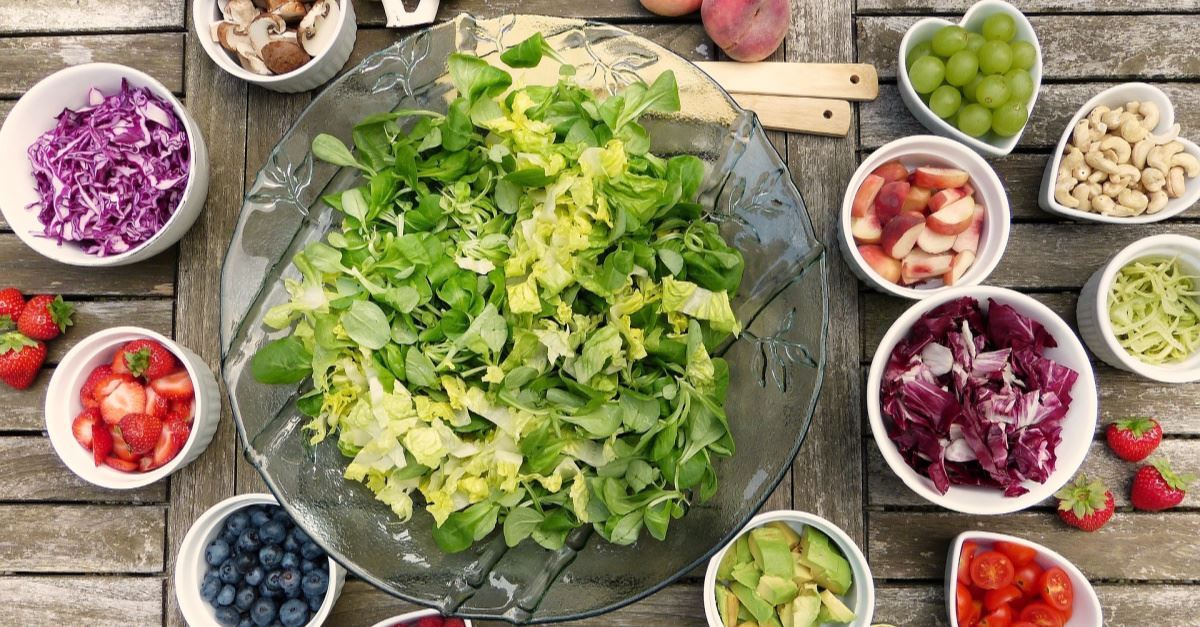
There are many views regarding what diet is ideal. Vegans, vegetarians, proponents of plant-based diets, and meat promoters all argue that their diet is best. Throw the raw diet crowd into the mix, and the confusion only increases. Many of these diets overlap but with some stark differences. For example, hard-core raw advocates don’t cook any food. They consume it straight from the tree, vine, or ground. Plant-based diets promote raw, but they are often flexible and have a much broader range of choices.
I don’t claim to have all the answers. Even experts in the field of nutrition are divided, but again, we can glean a great deal from the biblical account. Most diets are written from an evolutionary perspective, so it’s important that we get our facts straight. So let’s begin where God begins.
In the beginning of creation, God said:
“Behold, I have given you every plant yielding seed that is on the surface of all the earth, and every tree which has fruit yielding seed; it shall be food for you; and to every beast of the earth and to every bird of the sky and to everything that moves on the earth which has life, I have given every green plant for food”; and it was so. (Gen. 1:29–30 NASB)
We were designed to eat living, plant-based food. The life of the plant via vitamins, minerals, and enzymes is to be deposited into the body—to restore, renew, and replenish. We read that, after the flood, everything that lives and moves was to be food for us except the blood that is in the animal (Gen. 9:3). The blood of an animal contains toxins. Many diseases travel in the blood. God also identified clean and unclean animals. Un-clean animals, such as pork, are still not considered healthy since viruses, bacteria, and parasites are easily transferred from the pig to us.
Was man not to consume meat until after the flood, approximately 1,600 years after the fall? If so, why? Did early man eat only plants for over 16 centuries before God allowed meat? How did a plant-based diet provide vitamin B12, calcium, iron, and zinc when they are difficult to obtain in a plant-based diet? Is it permissible to eat meat and dairy but not ideal? Should it be consumed sparingly? Does it balance nature (i.e., kill and eat)?
 Biblically speaking, you can find support for a few different views,
but we are encouraged to let our moderation be known to all men.
Moderation means drinking or eating something occasionally.
Unfortunately, moderation is often abused, and very unhealthy patterns
develop. Paul said all things may be allowed, but all things are not
bene-ficial (1 Cor. 10:23). In most areas where people live the longest, their diets are primarily plant-based.
Biblically speaking, you can find support for a few different views,
but we are encouraged to let our moderation be known to all men.
Moderation means drinking or eating something occasionally.
Unfortunately, moderation is often abused, and very unhealthy patterns
develop. Paul said all things may be allowed, but all things are not
bene-ficial (1 Cor. 10:23). In most areas where people live the longest, their diets are primarily plant-based.I believe that the pre-flood atmosphere of the earth was much different than our living conditions today. Man lived in a healthier en-vironment that may have provided more oxygen and greater protection against the harmful rays of the sun, and plants and fruit-bearing trees grew in abundance. After the flood, however, fruits and vegetables became scarce (see Gen. 8:22: seedtime and harvest). I believe that God allowed meat consumption because of this scarcity. Healthy meat and dairy can be enjoyed from time to time for those who want to go this route, but it shouldn’t be consumed in abundance. Personally, I’d rather err on the side of eating what we ate before the fall as my primary source of nutrition. But again, this is my opinion.
- In Ezekiel 4:9, we read that Ezekiel was to take “wheat, barley, beans, lentils, millet, and spelt . . . and make bread.” This was his diet for over a year. Was it for convenience sake or health sake? We can only speculate, but this plant combination had/has many health benefits.
- In Daniel 1, Daniel ate vegetables and water for 10 days and looked better than those who ate meat and delicacies. Plant food brings life (Rev. 22:2). It should be our primary focus at every meal.
- In Daniel 10, it appears that he did this again for 21 days. The spiritual outcome was incredible. I find it interesting that God blesses fasts where only vegetables are consumed.
- Meat aligns more with our animalistic nature; cravings for meat have been the downfall of many (see Num. 11). People were often rebuked because of gluttony over meat.
- When God fed the children of Israel in the wilderness, He provided “bread from heaven” known as manna (Ex. 16:4; John 6:31). The people made it into cakes or boiled it. It had the appearance of bdellium (from trees). The Bible states the manna tasted like wafers made with honey. The perfect food that God chose appears to be plant-based, not meat-based. This is rather compelling for me. Then God brought in millions of quail because the people “lusted for meat.”
- But in Acts 10, we find that Peter had a vision in which God instructed him to kill and eat meat.
- In Romans 14:1–2, the apostle Paul talks about not judging a person who eats meat. Granted, this could be referring to the unclean nature of certain foods and whether those foods were offered to idols rather than being a proof text for meat-based diets.
- In 1 Timothy 4:3–4, Paul said that in the last days deceiving spirits will command people to abstain from certain foods—foods which God created to be received with thanksgiving. This verse is one reason why I don’t prohibit any food that God created for food, including healthy meat and dairy.
My Thoughts on the Disease Epidemic
Let’s look at what a day for a typical Christian might look like:
The day may begin with unhealthy cereal and milk, along with sugar water—that is, pasteurized orange juice. Or we may grab a large cup of coffee as we frantically run out the door. Sadly, there is little time for God.
We fail to get adequate sleep as well as adequate amounts of water. Contrary to popular thought, the body cannot acquire restful sleep after consuming caffeine. The only reason a person can fall asleep after consuming it is because of sheer exhaustion. With caffeine in the system, deep sleep vital to health and recovery remains elusive; therefore, we wake up exhausted instead of refreshed.
Lunch may consist of fast food or a “healthy” turkey sandwich containing sodium nitrates in the meat, processed bread, and nutrient-deficient cheese. We may also purchase a bag of so-called healthy chips and a drink loaded with sugar.
We come home exhausted and quickly prepare a large piece of meat with heaps of pasta and a few pieces of limp broccoli for dinner. We spend the next few hours watching mindless entertainment while eating sugary sweets.
It’s a never-ending cycle of fatigue and stress that manifests itself in physical and mental illness, weight gain, and overall poor health. Think of what we are doing to our children by laying this unhealthy foundation early in their lives. It’s time to break this cycle!
Disease often prevails when the bad guys are fed and the good guys are starved. Oxidative stress is the battle in our body between free radicals (terrorists) and the antioxidants (good guys). The constant bombardment wears the body down, hence the words “oxidative stress.” Antioxidants found in living food are like the Army, Navy, Air Force, and Marines. Antioxidants disarm the free-radical terrorists by donating electrons to them. They become stable rather than radical.
A Quick Recap
Here are five ways we can fuel disease based on what we have covered so far:
- Unhealthy meat is a toxic choice if we factor in growth hormones, antibiotics, drug residue, pathogens, worms, biotoxins, and carcinogens from packaging as well as cooking. And most dairy products have been tainted and altered. If poor choices are made in this area, more terrorists are deployed into the body. I’m not against healthy meat and dairy in moderation; I’m against toxic meat and dairy in abundance. In countries like Austria and France and in areas near the Mediterranean, heart disease is much lower than in America, even though they eat more fat. We must look at all factors that cause inflammation and disease. Most antioxidants found in meat and dairy come from the nutrient-rich plants that the animals eat. If animals are fed genetically modified feed with zero life-giving benefits and injected with hormones and antibiotics, these factors will lower their antioxidant output.
- If high levels of sugar, such as high fructose corn syrup, dextrose, maltose, rice syrup, sucrose, and dozens more, are added to the terrorism team, the strength of the enemy grows. Increased levels of sugar intake, along with a substantial rise in meat or dairy consumption, could be one possible link to cancer—the one-two punch. Dr. Joel Fuhrman has noted this as well. High sugar intake releases insulin into the bloodstream, and high levels of animal protein consumption can raise insulin-like growth factor 1(IGF-1). IGF-1 is a hormone that is similar to insulin. It joins with growth hormone to reproduce and regenerate cells. This is great news if the cells are healthy but bad news if they are cancerous. In short, excess sugar sparks the flame of disease, and the abundant IGF-1 throws gas on the fire. (Also avoid fake sweeteners such as aspartame, which is also known as AminoSweet, Nutrasweet, and Equal, at all costs. They are chemicals, not natural sweeteners.)
- If we add refined vegetable oils to the terrorism team, arteries and healthy cells become damaged due to inflammation.
- Add the failure to fast to the equation and the enemy gains additional ground. Fasting invites SEAL Team Sixto the battle. Among other things, fasting starves the fuel source of free radicals because most toxins are released during the digestion of food. Imagine what a bowl of junk cereal releases into your body compared to nothing being released when fasting. I believe that fasting slows aging for this very reason: It minimizes toxins while allowing the body to cleanse and rebuild. Granted, fasting will cause the body to release stored toxins as part of the cleansing process, but the body is prepared for this.
- Throw inactivity into the battle, and the terrorists gain even more strength. Our bodies were not designed to sit for long periods of time. In 2006, Harvard Medical School made the following statement: “Exercise helps prevent atherosclerosis. It keeps arteries healthy by lowering LDL (“bad”) cholesterol and boosting HDL (“good”) cholesterol. And it also helps by improving other atherosclerotic risk factors such as high blood pressure, diabetes, obesity, stress, and various other factors that promote blood clots.” Inactivity often leads to weight gain and sluggish blood flow. Remember that every pound of fat requires a few extra miles of blood vessels. That means more work for the body, especially the heart. Lose the excess and bring in more reinforcements.
No comments:
Post a Comment